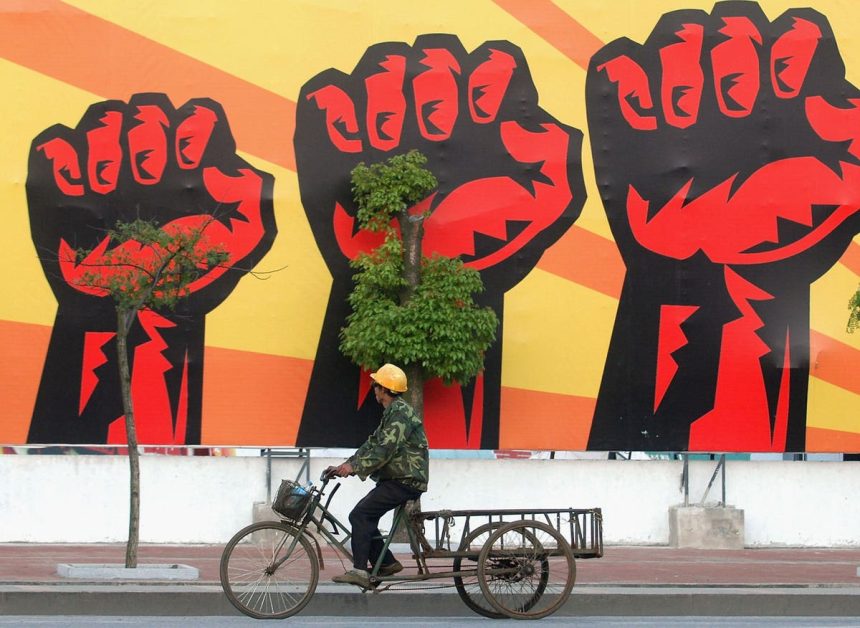China’s economy is in a sorry state. The nation’s gross domestic product (GDP) for the second quarter disappointed both official and unofficial expectations. All sectors showed weakness, though some worse than others. China will fail to achieve its already reduced 5% real growth target for this year. The blame for this sorry state of affairs lies mostly with Beijing’s planners. Worse, policy makers have few options to turn things around any time soon.
GDP in the spring quarter grew 6.3% in real terms from the second quarter a year ago. That seemingly strong showing resulted more from how depressed the economy was in early 2022 than from any recent momentum. This most recent quarter’s real GDP was only 0.8% above the first quarter reading, a major slowdown from quarterly growth of 2.2% recorded for that first quarter. The brief January-March surge gave a decidedly false signal. Mostly it reflected a short-lived jump in consumer spending after Beijing finally gave up the zero-Covid policies of seemingly endless lockdowns and quarantines. But even as that consumer spending flow was taking place, evidence behind the aggregates signaled that it occurred almost exclusively among the wealthy. Now more recent figures confirm how weak the economy always was.
June’s report on consumer spending was most telling. May, still reflecting the post-zero-Covid exuberance, showed a 12.7% growth in retail sales over year-ago levels, but June saw a very modest advance of only 3.1%. This shortfall clearly reflects other signs that the Chinese householder has lost confidence amid the news of declining real estate values and because the zero-Covid lockdowns raised questions about the average working person’s ability to earn consistently. Instead of spending, fearful and wary Chinese householders are socking money away in savings. Household savings deposits rose some 18% during the first half of 2023. Those funds could be ammunition for a spending surge, but only if Chinese consumers change their feelings radically, and that does not seem likely.
On at least two counts, Beijing cannot escape blame for this lack of consumer confidence. Its misguided and overly severe Covid policies clearly have contributed to the sour feelings among all but the wealthiest Chinese. On the matter of real estate losses, the authorities have gone out of their way to blame the collapse on private developers, many of which have gone bankrupt, including the giant, Evergrande. But the fall in real estate values can be laid at Beijing’s feet, too. Whatever failings the managements of these firms have shown, most of the economy’s real estate problems and those of the now defunct developers lie in Beijing’s years-long stress on residential real estate development, a push that as recently as 2021 had inflated the sector to an unsustainable level of some 25% of the economy. Years of excessive building, often in places chosen by central planners instead of from market signals, created the distorted and excessive building that has led directly to this now years-long drop in property prices.
A different sort of Beijing failure has created a shortfall in business investment. Until very recently, President Xi Jinping has spoken of a need for China to recapture its Marxist principles. He has roundly attacked private business and its owners, suggesting that they are somehow evil for pursuing market signals instead of Communist Party objectives. Such rhetoric could not help but instill extreme caution into private business owners and managers, and certainly a reluctance to expand, hire, and invest. (There is little available evidence, but the situation probably induced many to find havens for their assets overseas outside Xi’s control.) More recently Xi has changed his tune, referring to entrepreneurs as “our own people.” So far, however, the wariness among businesspeople remains. Over the past six months, investment spending by private businesses has actually shrunk, and the pace of decline has accelerated month to month.
A collapse in exports – the other major drag on China’s economy — is less directly linked to Beijing’s mismanagement. Europe is in recession, and the United States, though still growing, is from robust economy. The lack of buying by these economies and perennially-weak Japan has depressed Chines exports – still the mainstay of the economy. Throughout the spring quarter, export volumes have fallen and dropped 12.4% in June alone. Some blame even for this problem, can also find its way back to Beijing. For years, the party’s planners have talked about re-orienting China’s economy away from its overwhelming reliance on exports. But they have failed to act. The effort, it seems, has gone mostly into rhetoric and less into policy. Had Beijing acted, China might be less sensitive to overseas economic matters than it clearly is today.
Disappointing economic performance has elicited calls for redoubled stimulus efforts. The People’s Bank of China (PBOC) has cut interest rates more than once, and PBOC Deputy Governor Liu Guoqiang has promised more “counter-cyclical adjustments.” Beijing has also turned to its standard source of stimulus: infrastructure spending. After a splurge in 2022, public investment spending has increased 8.1% over the January-June period. But in the face of low confidence among consumers and businesses, it remains an open question whether targeted tax breaks on electric vehicles and the like or lower borrowing rates can generate much more activity. And if past infrastructure efforts have thus far failed to create more economic momentum, what promise can still more of the same offer?
Wherever the blame lies, it should be apparent by now that the Communist Party in Beijing no longer directs the economic juggernaut it once did. Whether the party admits it or not, it is apparent that growth in the future will proceed at a much slower pace than the one to which China and the world have grown accustomed. Much is due to the failures of the centrally planned structure that Beijing has embraced.
Read the full article here









